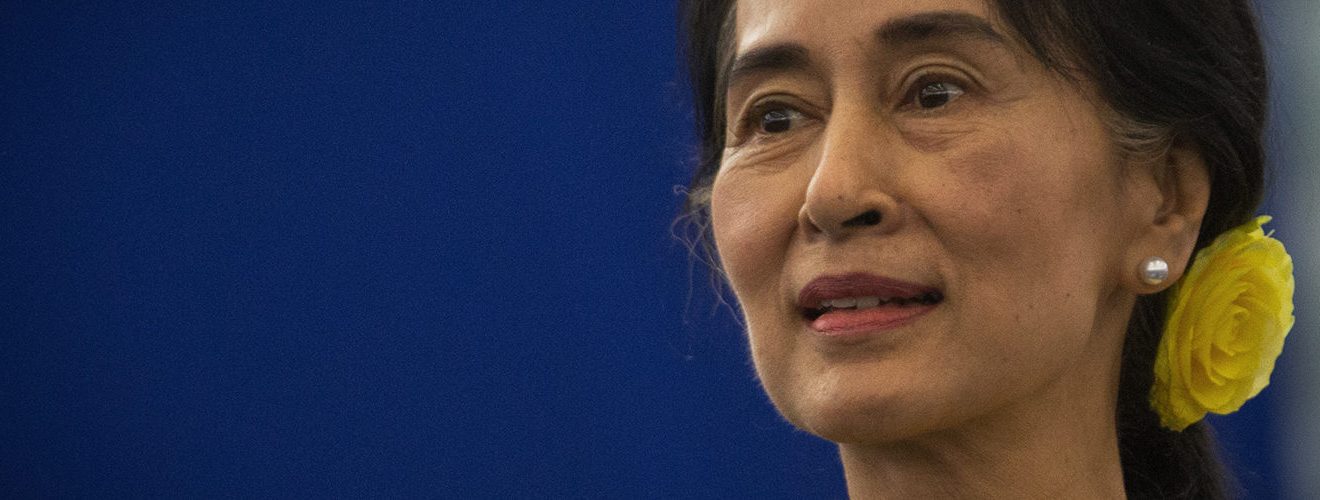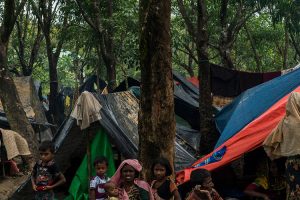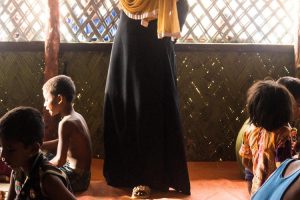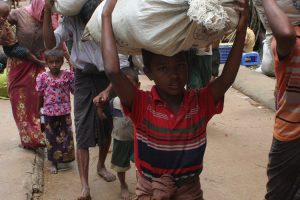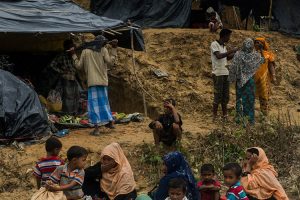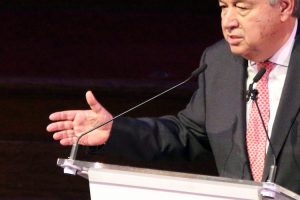Myanmar’s de facto leader, State Counselor Aung San Suu Kyi said on Tuesday, September 19, that the country does not “fear international scrutiny” over a military crackdown that has seen hundreds of thousands of people flee to Bangladesh in recent weeks.
In a public address in English to United Nations officials, foreign diplomats, government staff and journalists in Myanmar’s parliament, her first since the military operations in Rakhine state began, Suu Kyi pointedly did not criticise army actions, instead condemning “unlawful violence.”
The UN estimates 420,000 Rohingya people have fled to the Cox’s Bazar area of Bangladesh from Myanmar since August 25, when the Arakan Rohingya Salvation Army militant group attacked 30 police outposts in Rakhine state, sparking a government crackdown and widespread violence. There are now almost 620,000 refugees from Myanmar in Bangladesh.
UN High Commissioner for Human Rights Zeid Ra’ad Al Hussein said on September 11 that the government response seemed “a textbook example of ethnic cleansing,” an assessment not disputed by UN Secretary General António Guterres on Sept 13.
Suu Kyi said that she was ware that the world was watching the situation unfolding in Rakhine state. “As a responsible member of the community of nations Myanmar does not fear international scrutiny,” she said.
“We condemn all human rights violations and unlawful violence. We are committed to the restoration of peace and stability and rule of law throughout the state.”
“Action will be taken against all people, regardless of their religion, race and political position, who go against the law of the land and violate human rights,” she said, adding that the government would not “abnegate responsibility.”
“There have been allegations and counter-allegations … We have to make sure those allegations are based on solid evidence before we take action,” she said, adding that she wanted to bring understanding and harmony rather than more conflict.
Ten members of the government’s Implementation Committee for Recommendations on Rakhine State began a two-day fact-finding visit to the state on Monday. The committee was formed on September 12 to assess and implement recommendations made by the Kofi Annan-led Advisory Commission on Rakhine State.
“After their trip, we will set priorities for implementing recommendations and draw an action plan within two weeks,” committee chair Win Myat Aye said.
Suu Kyi claims no conflict since September 5
Suu Kyi insisted there had been “no conflicts since 5 September and no clearance operations” against the Rohingya, a point widely disputed by people who have fled violence, and by others who fear leaving because they are cut off by hostile Buddhists.
“We are concerned to hear that numbers of Muslims are fleeing across the border to Bangladesh,” she said. “We want to find out why this exodus is happening. We would like to talk to those who have fled as well as those who have stayed.”
Suu Kyi claimed the “great majority of Muslims” in Rakhine have not left the country. “More than 50 percent of the villages of Muslims are intact, they are as they were before the attacks took place,” she said, inviting diplomats in Myanmar to go and “study the peaceful areas.
Myanmar’s government has tightly restricted access to Rakhine state. UN Secretary-General Antonio Guterres said on September 13 that humanitarian work by both UN agencies and international non-governmental organisations has been severely disrupted and urged the government to “ensure the delivery of vital humanitarian aid.”
Myanmar government spokesperson Zaw Htay said on September 13 that 176 out of 471 Rohingya villages in three townships in Rakhine state were now empty and that some residents fled from at least 34 other villages.
Earlier on Tuesday, Human Rights Watch published new analysis of satellite imagery which it said shows 214 villages with more than 90 percent of the structures damaged.
Refugee returns
Referring to a 1993 agreement, Suu Kyi said that Myanmar would accept the return of refugees from Bangladesh “without any problem,” but a March report by Annan’s Rakhine Commission said that only around 2,000 Rohingya had by then been granted Myanmar citizenship.
UN human rights commissioner Zeid said on September 11 that Myanmar’s stance that Rohingya refugees can only return if they provide proof of nationality resembled a “cynical ploy to forcibly transfer large numbers of people without possibility of return.”
During her speech, Suu Kyi said the word Rohingya only once, referring to the Arakan Rohingya Salvation Army. Many in majority-Buddhist Myanmar say the Rohingya are illegal immigrants from Bangladesh, referring to them as “Bengali.”
Rights groups react
Responding to Suu Kyi’s assertion that military operations had ended, the deputy director of Human Rights Watch’s Asia division, Phil Robertson said: “If that is true, then who is burning all the villages we’ve seen in the past two weeks?”
Hmm #ASSK asks who burned villages since 5 Sept? @ZawHtayMyanmar said earlier 210 villages partial/total abandoned. So #Tatmadaw? #Rakhine? pic.twitter.com/avh7fZo6ld
— Phil Robertson (@Reaproy) September 19, 2017
Robertson said that Suu Kyi must face the fact that the security forces “don’t follow a code of conduct and shoot and kill who they want.”
“She is trying to claw back some degree of credibility with the international community, without saying too much that will get her in trouble with the [military] and Burmese people who don’t like the Rohingya in the first place,” Robertson said.
James Gomez, Amnesty International’s Regional Director for Southeast Asia and the Pacific, said Suu Kyi’s speech “amounted to little more than a mix of untruths and victim blaming.”
“There is overwhelming evidence that security forces are engaged in a campaign of ethnic cleansing through murder and forced displacement … she is still silent about the role of the security forces in this,” he said.
“Myanmar has repeatedly said it will not co-operate with the UN-mandated Fact Finding Mission established earlier this year,” Gomez said, calling on the government to give UN investigators and humanitarian organisations “unfettered access to all areas.”
An edited version of this post was published by The Globe Post

